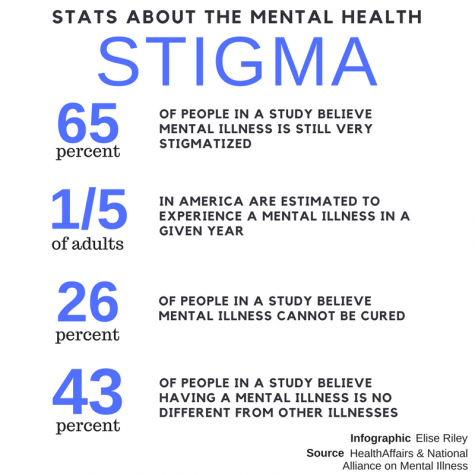Mental Health Awareness Week: Stigmas intensified following shooting
Negative attention to mental health creates misconceptions
Following most mass shootings in modern American history, including the most recent in Las Vegas, discussion occurs regarding the shooter’s mental status.
While the shooter’s mental health is definitely a factor to analyze in the investigation, it is often unacceptably used as a scapegoat to distract from other real underlying issues.
The mentality created by spotlighting mental illness after mass shootings is twofold; that mentally ill people are more likely to commit crimes, and that tragedies such as the Las Vegas shooting are only committed by the mentally ill.
This is not the truth. According to the National Institutes of Health, less than 3-5 percent of American crimes involve mentally ill people.
Giving mental health negative attention following a tragedy only serves to worsen the preexisting stigma surrounding the topic. People living with mental disorders are already labeled as “unstable,” “crazy” and other stereotypes. “Dangerous” does not need to be added to that list.
In a study on the general public by HealthAffairs, 24 percent of people believed those living with a mental illness were far more dangerous than someone without. This shows the widespread misunderstanding of mental illness in America, and the fear of that unknown reaches a troubling amount of people.
The misconception that people with mental illnesses are violent only adds to the stigmatization and judgment of mental health.
According to the Center for Disease Control and Prevention, only 25 percent of adults with symptoms of a mental illness believe others are sympathetic of those with mental illnesses. That means the majority of people with a mental disorder feel stigmatized, and that is completely inappropriate for the progressive society we live in.

The reality is, the vast majority of people living with a mental illness would not and could not commit mass murder. Most live peaceful, nondestructive lives, and reacting to a mass shooting by drawing untrue or uneducated assumptions about mental illness invalidates that.
Making a mass murderer the poster child of mental illness grossly misrepresents the average American living with a mental illness, which is one in five adults, according to the National Alliance on Mental Illness.
What ideally should happen following a crime involving a person with a mental disorder is that awareness should be raised. Focus should be placed on educating the public about how to identify and get help for themselves or loved ones with a mental illness. Mental illnesses need to be treated like physical illnesses: real, valid and treatable.
If the stigma around mental illness is lessened, people struggling severely can get the help they need before they end up in the headlines for committing a crime.

Oh hey there! Odds are I'm currently wearing at least one Nebraska-themed clothing item right now (could be a bikini, sweatshirt, t shirt, sweatpants,...


